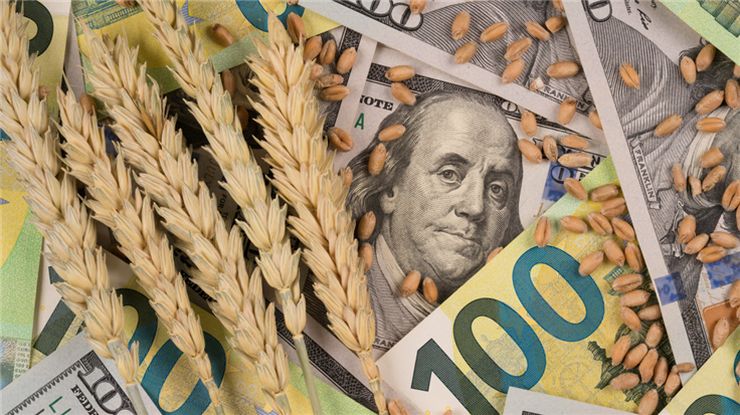Wheat prices rose amid lower estimates of global production and stocks

Wheat prices, initially largely unresponsive to the USDA report, rallied sharply yesterday as traders scrutinized the new balance sheet and realized that the supply of food wheat this season will be quite low, so at some point supply will not be able to meet demand. The ratio of stocks to consumption of wheat in the balance of MY 2023/24 will be the lowest in the last 9 years, and excluding China – in the last 16 years.
Yesterday, December futures rose in price:
- by 1.6% to $219.5/t – for soft winter SRW wheat in Chicago,
- by 1.9% to $273.6/t – for hard winter HRW wheat in Kansas City,
- by 1% to $289.4/t – for hard spring HRS-wheat in Minneapolis,
- by 2.6% to €238/t or $255.6/t – for wheat on the Paris Euronext.
European wheat remains more expensive than Russian wheat, which makes competition difficult. According to the European Commission, the export of soft wheat from the EU in the 2023/24 MY decreased compared to the previous season by 27% from 8.02 to 5.84 million tons. At the same time, the import of wheat and its processing products to the EU in the current season increased by 112% to 1.889 million tons, in particular the import of soft wheat grew by 71% to 1.37 million tons, and durum wheat – by 13 times to 473 thousand tons.
The main suppliers of soft wheat to the EU in the current season were Ukraine (814 thousand tons) and Canada (149 thousand tons), and durum wheat – Turkey (209 thousand tons) and the Russian Federation (129 thousand tons).
In July-August, Ukraine exported 2.26 million tons of wheat (1.65 million tons last year), however, the blocking of the Black Sea ports and constant shelling of the Danube ports reduce the pace of exports.
Purchase prices for wheat delivered to Danube ports remain at a low level of $155-160/t or UAH 6,500-6,700/t for food grain and $140-145/t or UAH 5,500-5,700/t for feed grain. The continuation of the ban on grain deliveries from Ukraine to neighboring EU countries after September 15 will further increase the pressure on prices.
Ukrainian farmers do not want to sow winter wheat due to the low profitability of cultivation. Intensification of soil drought may also reduce the area sown and worsen the prospects of the future harvest, which, against the background of the reduction of world reserves in 2023/24 MR, will lead to another increase in world prices.
Read also
Wheat in Southern Brazil Impacted by Dry Weather and Frosts
Oilseed Industry. Leaders and Strategies in the Times of a Great Change
Black Sea & Danube Region: Oilseed and Vegoil Markets Within Ongoing Transfor...
Serbia. The drought will cause extremely high losses for farmers this year
2023/24 Safrinha Corn in Brazil 91% Harvested
Write to us
Our manager will contact you soon



